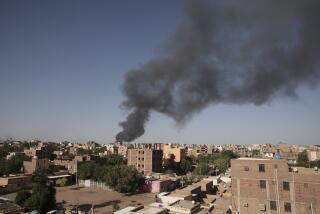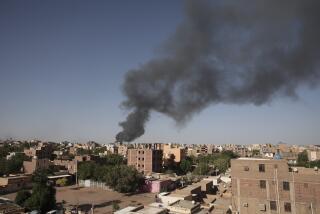Iraq Blocks Embassies : 100 U.S. Diplomats, Families Held in Baghdad : Troops Around U.S., Other Consulates in Kuwait City
- Share via
Iraqi troops blocked the U.S. Embassy and at least eight other consulates in Kuwait city today, and a European envoy said Baghdad threatened to use force to remove diplomats remaining at their posts Saturday.
The White House, meanwhile, said Iraq had reneged on its promise to allow U.S. Embassy personnel to leave Baghdad and was detaining them. The more than 100 American men, women and children had left the U.S. Embassy in Kuwait and were staying in the U.S. Embassy in Baghdad, spokesman Marlin Fitzwater said.
Fitzwater said Iraqi military forces “of one kind or another are around the embassy” in Kuwait, where Ambassador Nathaniel Howell and a handful of aides remain.
“(The Iraqis) have not made any moves against the embassy or intruded in any fashion, but they are nevertheless present. It would appear that people are not being allowed to enter or leave the embassy,” Fitzwater said at a briefing in Kennebunkport, Me.
Iraq, which invaded and annexed Kuwait earlier this month, had given foreign governments until 10 a.m. PDT today to vacate their embassies in Kuwait.
But Spain’s ambassador to Jordan, Ramon Armengod, told a news conference in Madrid today that Iraqi authorities told Western embassies in Kuwait that they now had until 9:30 p.m. PDT to close.
Armengod said that after that deadline, Iraqi troops would forcibly remove remaining Western diplomats from their missions.
In addition to the U.S. Embassy, the British Embassy and the missions of France, Japan, Norway, Sweden, Hungary, West Germany and Romania reportedly were surrounded in Kuwait.
The Soviet Union evacuated all its nationals from Kuwait and left its embassy there empty but not closed. President Mikhail S. Gorbachev sent a message to Iraq’s president warning that the situation is “extremely dangerous.”
So far, Iraq has not directly linked closing the U.S. Embassy in Kuwait to permitting the American diplomats and their dependents in Baghdad to leave Iraq, a U.S. official said. But others said their plight obviously is tied to the dispute.
White House spokesman Fitzwater called on Iraq “to permit and facilitate the immediate departure” of the Americans from Baghdad.
Fitzwater said the Americans had been supposed to go to Turkey. That was the first disclosure of their projected destination.
About 100 are in the group, including nearly 30 children. They made the trip from Kuwait city in a 33-car caravan, arriving in Baghdad early today after a journey of nearly 20 hours.
Iraqi President Saddam Hussein had promised them safe passage even though 2,500 private U.S. citizens in Kuwait and more than 500 in Iraq are being refused permission to leave.
Jordanian officials were again allowing thousands of refugees to cross over from Iraq today, despite an announcement earlier this week that the border would be closed to them.
But Turkey, another escape route for refugees, said today it might close its border with Iraq.
Jordan had said Wednesday that it was closing its border with Iraq, effective Thursday, because of the strain caused by tens of thousands of refugees who have flooded the country since the Aug. 2 Iraqi invasion of Kuwait.
But a senior border security official said 6,000 foreigners, mainly Arabs or Asians, had crossed from Iraq at the Ruweishid border post, 210 miles northeast of Amman, by midday today.
The official Jordanian news agency Petra quoted an Interior Ministry spokesman as saying that border officials had been told to let in 20,000 evacuees today.
A Jordanian government official said many countries had appealed to Amman to rescind its order to close the border, one of the few escape routes from Iraq.
“We want to tell the world that we closed the borders only because the massive influx of people was creating serious problems for us,” the official said.
Meanwhile, in Turkey, which also borders Iraq, beleaguered officials said they may close the frontier with Iraq unless countries whose nationals are coming through take steps to ensure quick transit.
Premier Yildirim Akabulut said Turkey’s only crossing point with Iraq, the Habur post, was built for commercial truck traffic and lacks facilities to handle large numbers of people.
More to Read
Sign up for Essential California
The most important California stories and recommendations in your inbox every morning.
You may occasionally receive promotional content from the Los Angeles Times.









